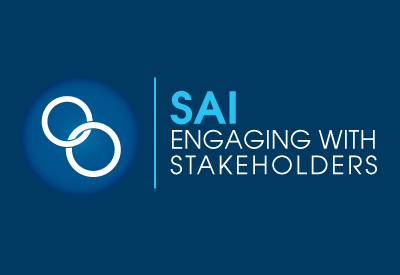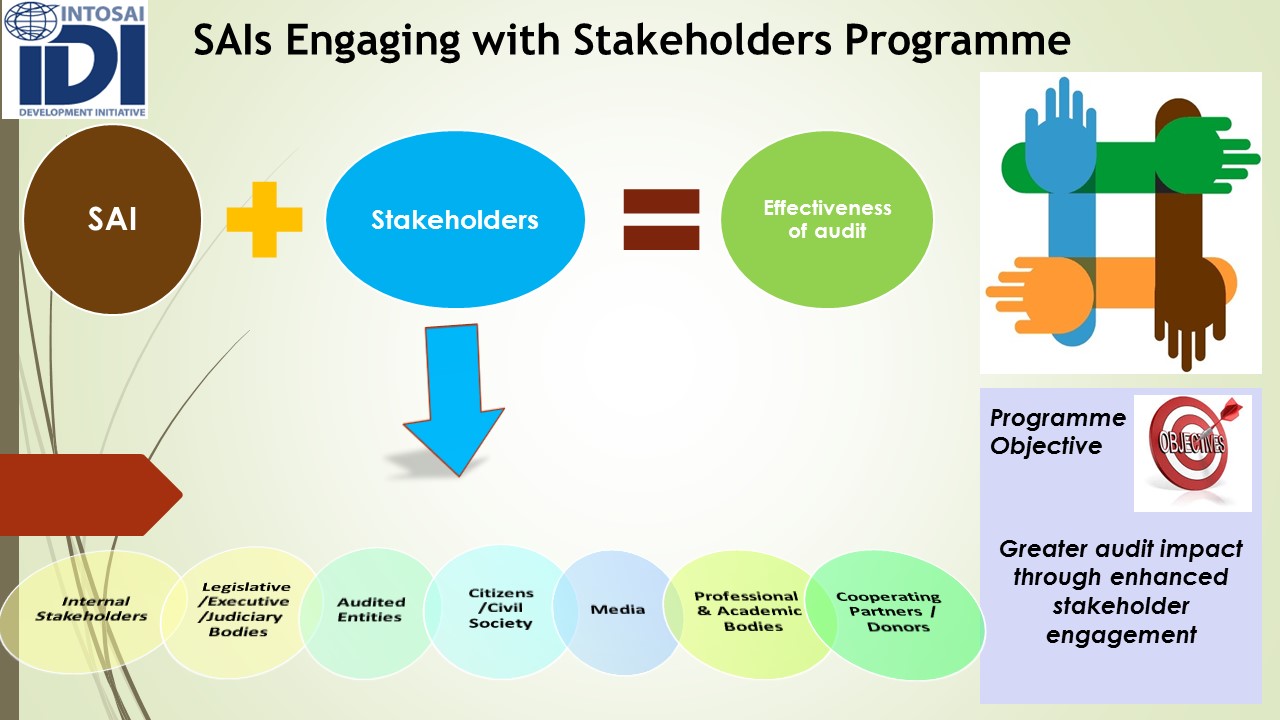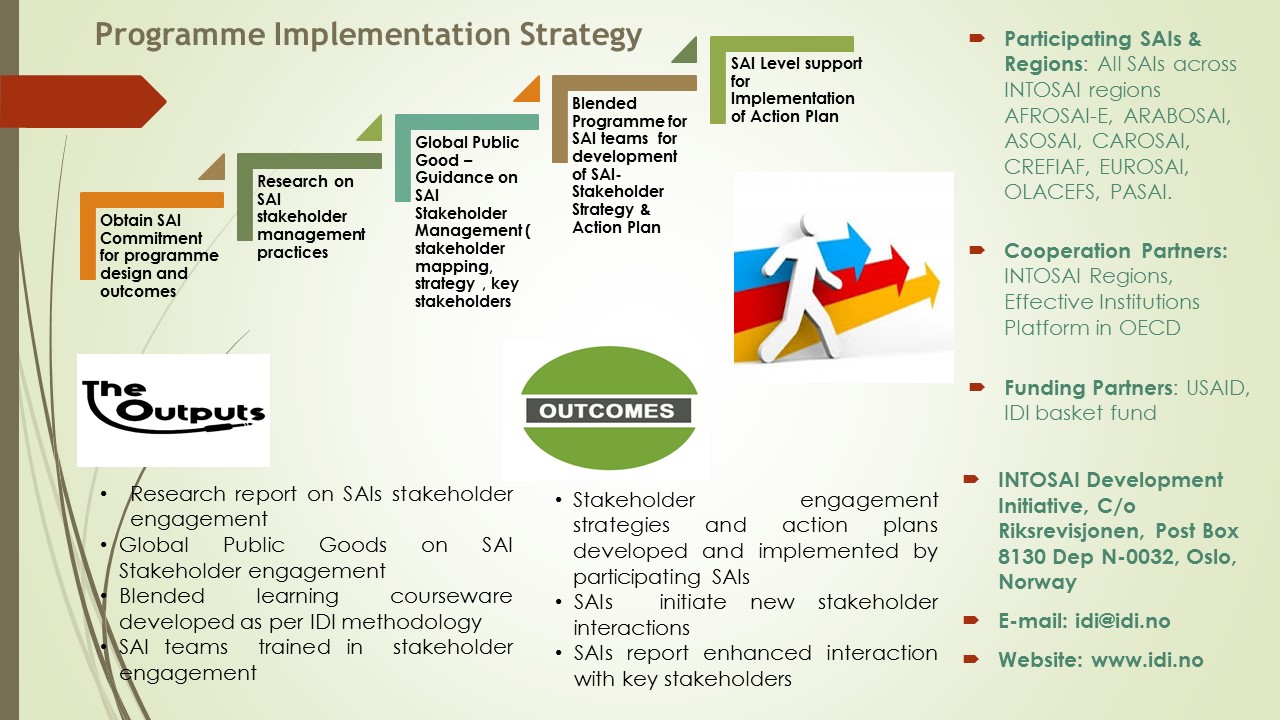About IDI
Our Cross-Cutting Priorities
Our Results
Meet the IDI Board
IDI's Board is composed of ten members from different supreme audit institutions. Get to know them better in our "Meet the Board" series.

SAIs Engaging With Stakeholders is an IDI initiative to support SAIs in improving their engagement with external stakeholders such as legislators, civil society, auditees, and citizens.
The initiative ran primarily during IDI's previous strategic period and is now in its final wrap-up phase. Informaiton on the initiative can be found below.
In democracies, SAIs have a critical role in holding governments to account and enabling legislative oversight. SAIs are a critical part of the national accountability architecture. Given their mandates to “watch” over government accounts, operations and performance, they should be natural partners of citizens in exercising public scrutiny. The scope of SAI’s work is to increase transparency for the benefit of citizens through external auditing. The effectiveness of SAIs’ operations can be greatly enhanced through sustained interaction with the various stakeholders which include the executive, legislature, media, civil society organizations and the citizens. During INCOSAI 2010, INTOSAI recognized that, “The effectiveness with which SAIs fulfill their role of holding the government to account for the use of public money not only depends on the quality of their work, but also on how effectively they are working in partnership with the accountability functions of the legislature as well as the executive arm of government in making use of audit findings and enacting change.” Besides external stakeholders, the communication and engagement of internal stakeholders within the SAI significantly impacts the quality of SAI work and results. While many SAIs face challenges both in their engagement with stakeholders, there are excellent examples of good practices in stakeholder engagement. SAI’s engagement with stakeholders is impacted by both, the SAIs own capacity to engage and the readiness and capacity of stakeholders to engage meaningfully with the SAI. Enhanced SAI stakeholder engagement can lead to greater audit impact and enable the SAI in delivering envisaged value and benefits. In its strategic plan, IDI has identified SAI stakeholder engagement as a priority. This was also identified as one of the key areas for support in the IDI global survey 2014. The programme design has been developed and agreed with a variety of stakeholders at the planning Meeting in September 2015.
In 2016 a link was also established to the SAI Independence programme. The previous version of this programme mainly envisaged SAI- Stakeholder engagement as a part of the SAI audit process that would lead to greater audit impact. Discussions on the SAI Independence programme led to the conclusion that as an SAI endeavours to strengthen its independence, its engagement with stakeholders is a key success factor. SAIs will thus be supported in engaging with stakeholders not only as a part of their audit process but also as a part of the efforts to gain greater independence.


The effectiveness of the programme is firmly under the control of the SAI. In order to facilitate achievement of SAI outcomes, it is necessary to agree on stakeholder commitments with SAI leadership.
The implementation of this programme started in 2015 with a planning workshop of key stakeholders, including INTOSAI regions. Subsequently, the IDI in its meetings with SAI Management and key stakeholders in different regions discussed the status of stakeholder engagement in SAIs, initiatives and challenges. The detailed commitments for the programme were also discussed with SAIs.
The research component of this programme mainly aims at identifying the current SAIs mechanisms in engaging with stakeholders, the key success factors that have supported SAIs in effectively engaging with stakeholders and the challenges faced. The research also attempts to get an overview of the support work already done in this regard. It is mainly a desk review carried out through the analysis of various papers, evaluation and surveys that have been carried out by various stakeholders.
A global resource team is working on this project and the research report is expected to feed into the development of guidance on SAI stakeholder management.
A team of global resource persons will also design and develop a blended learning programme on engaging with stakeholders for SAI teams. The programme will be developed in English and adapted to Arabic, Spanish and French by the regional teams working on the programme. SAI teams consisting of people engaged in stakeholder management are expected to participate in this programme. As a part of the programme, SAIs will develop stakeholder engagement strategies and action plan.
The guidance on engaging with stakeholders was first developed in English and will be translated into other languages. This Global Public Good (GPG) is expected to provide good practice guidance on how to conduct stakeholder mapping, developing a stakeholder management strategy and action plan, communicate the audit message clearly and the dynamics involved in engaging with different stakeholders. It will contain among others;
The guidance document also includes specific guidance on engaging with certain key stakeholders e.g. parliaments, citizens, media.
While engaging with stakeholders will be considered mainly in the context of the audit process, the guidance will also include deliberation on engaging with stakeholders in the context of moving towards greater SAI independence.
Besides the core team writing the guidance, key stakeholders in INTOSAI, including INTOSAI regions and selected SAIs, will review this document. Click to download the pdfGuidance on Supreme Audit Institutions' Engagement with Stakeholders (2.70 MB)
While all participating SAIs will be expected to implement their action plans, the IDI will provide SAI level support to a selected number of SAIs to implement their strategies.
The support provided at SAI level can consist of a variety of interventions e.g. internal communications interventions, SAI audited entity workshops, SAI-PAC workshops, media training, engagement with civil society organisations, implementing strategies for greater citizens engagement in the audit process etc. The support provided will depend on the nature of the SAI strategy and the resources available. SAIs to be supported will be selected on the basis of the level of their commitment, quality of their strategy documents and preparedness for engaging with stakeholders.


